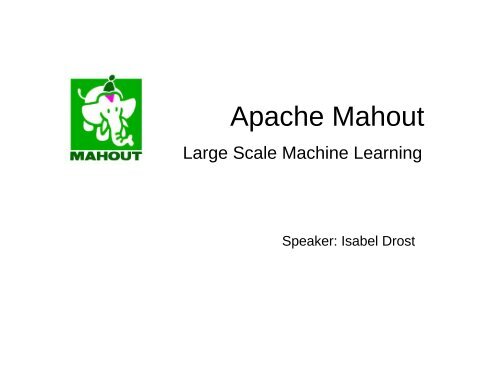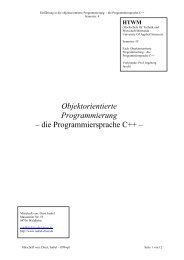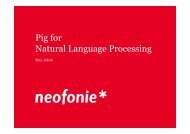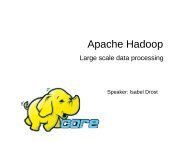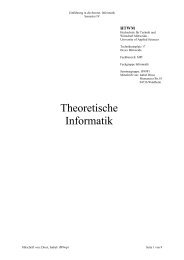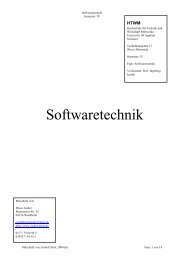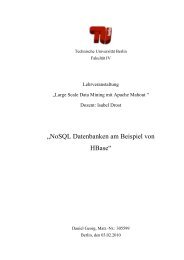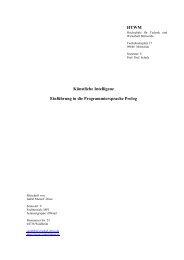Apache Mahout
Apache Mahout
Apache Mahout
You also want an ePaper? Increase the reach of your titles
YUMPU automatically turns print PDFs into web optimized ePapers that Google loves.
<strong>Apache</strong> <strong>Mahout</strong><br />
Large Scale Machine Learning<br />
Speaker: Isabel Drost
Isabel Drost<br />
Nighttime:<br />
Came to nutch in 2004.<br />
Co-Founder <strong>Apache</strong> <strong>Mahout</strong>.<br />
Organizer of Berlin Hadoop Get Together.<br />
Daytime:<br />
Software developer @ Berlin
Hello DAI!
Agenda<br />
●<br />
Motivation.<br />
●<br />
Why machine learning?<br />
●<br />
A short tour of Hadoop.<br />
●<br />
Introduction to <strong>Mahout</strong>.
January 3, 2006 by Matt Callow<br />
http://www.flickr.com/photos/blackcustard/81680010
News aggregation<br />
September 10, 2008 by Alex Barth<br />
http://www.flickr.com/photos/a-barth/2846621384<br />
Today: Read news papers,<br />
Blogs, Twitter, RSS feed.<br />
Wish: Aggregate sources<br />
and track emerging topics.
September 21, 2008, Rodrigo Galindez<br />
http://www.flickr.com/photos/rodrigogalindez/2877367250/
Go to cinema<br />
March 22, 2008 by Crystian Cruz<br />
http://www.flickr.com/photos/crystiancruz/2353895708<br />
Today: IMDB, zitty, movie review<br />
pages, twitter, blogs, ask friends.<br />
Wish: Reviews, sentiment<br />
detection, recommendations.
Machine learning – what's that?
Image by John Leech, from: The Comic History of Rome by Gilbert Abbott A Beckett.<br />
Bradbury, Evans & Co, London, 1850s<br />
Archimedes taking a Warm Bath
Archimedes model of nature
June 25, 2008 by chase-me<br />
http://www.flickr.com/photos/sasy/2609508999
An SVM's model of nature
Goals
●<br />
Industry ready.<br />
– Friendly license.<br />
– Scalable.<br />
●<br />
Easy to use.<br />
– Well documented.<br />
– Well maintained by healthy and active community.<br />
●<br />
Easy to extend and contribute to.<br />
– Automated tests.<br />
– Easy to build and deploy.
Open source machine learning:<br />
Challenges.
January 8, 2008 by Pink Sherbet Photography<br />
http://www.flickr.com/photos/pinksherbet/2177961471/<br />
Massive data to be processed<br />
during training (if any).<br />
At application time:<br />
Need for low latency<br />
and high throughput.
http://www.fickr.com/photos/jaaronfarr/3384940437/<br />
March 25, 2009 by jaaron<br />
Picture of developers / community<br />
February 29, 2008 by Thomas Claveirole<br />
http://www.fickr.com/photos/thomasclaveirole/2300932656/<br />
http://www.fickr.com/photos<br />
/jaaronfarr/3385756482/<br />
March 25, 2009 by jaaron<br />
May 1, 2007 by danny angus<br />
http://www.fickr.com/photos/killerbees/479864437/
Developers world wide
Open source developers<br />
Developers world wide
Developers world wide<br />
Developers<br />
interested<br />
in large scale<br />
applications<br />
Open source developers
Developers world wide<br />
Developers<br />
interested<br />
in large scale<br />
applications<br />
Machine<br />
learning<br />
people<br />
Open source developers
Developers world wide<br />
Developers<br />
interested<br />
in large scale<br />
applications<br />
<strong>Mahout</strong><br />
Machine<br />
learning<br />
people<br />
Open source developers
January 11, 2007, skreuzer<br />
http://www.flickr.com/photos/skreuzer/354316053/
Typical developer<br />
September 10, 2007 by .sanden.<br />
http://www.fickr.com/photos/daphid/1354523220/<br />
●<br />
●<br />
●<br />
Has never dealt with<br />
large (petabytes)<br />
amount of data.<br />
Has no thorough<br />
understanding of<br />
parallel programming.<br />
Has no time to make<br />
software production<br />
ready.
September 10, 2007 by .sanden.<br />
http://www.fickr.com/photos/daphid/1354523220/<br />
Typical developer<br />
Failure resistant: What if service X is unavailable?<br />
Failover built in: Hardware failure does happen.<br />
Documented logging: Understand message w/o code.<br />
Has never dealt with<br />
large (petabytes)<br />
amount of data.<br />
Monitoring: Which parameters indicate ● system's health?<br />
Automated deployment: How long to bring up machines?<br />
Backup: Where do backups go to, how to do restore?<br />
Scaling: What if load or amount of data double, triple?<br />
Many, many more.<br />
●<br />
●<br />
Has no thorough<br />
understanding of<br />
parallel programming.<br />
Has no time to make<br />
software production<br />
ready.
Requirements<br />
●<br />
Easy administration.<br />
– Failover.<br />
– Monitoring.<br />
●<br />
Easy to use.<br />
– Shield programmer from complexity.<br />
– Concentrate on functionality.<br />
– “Parallel programming on rails.”
We need a solution that:<br />
Is easy to use.<br />
Scales well beyond one node.
Java based implementation.<br />
Easy distributed programming.<br />
Well known in industry and research.<br />
Scales well beyond 1000 nodes.
Contributions need not be<br />
Hadoop based:<br />
PIG, JAQL, Cascading, ...?
Contributions need not be<br />
Hadoop based:<br />
PIG, JAQL, Cascading, ...?
Hadoop by example
pattern=”http://[0-9A-Za-z\-_\.]*”<br />
grep -o "$pattern" feeds.opml | sort | uniq --count
pattern=”http://[0-9A-Za-z\-_\.]*”<br />
grep -o "$pattern" feeds.opml<br />
| sort | uniq --count<br />
M A P | SHUFFLE | R E D U C E
Assumptions:<br />
Data to process does not fit on one node.<br />
Each node is commodity hardware.<br />
Failure happens.<br />
Ideas:<br />
Distribute filesystem.<br />
Built in replication.<br />
Automatic failover in case of failure.
Assumptions:<br />
Moving data is expensive.<br />
Moving computation is cheap.<br />
Distributed computation is easy.<br />
Ideas:<br />
Move computation to data.<br />
Write software that is easy to distribute.
M A P | SHUFFLE | R E D U C E<br />
Local to data.
M A P | SHUFFLE | R E D U C E<br />
output<br />
Local to data.<br />
Outputs a lot less data.<br />
Output can cheaply move.
M A P | SHUFFLE | R E D U C E<br />
output<br />
Local to data.<br />
Outputs a lot less data.<br />
Output can cheaply move.
r<br />
M A P | SHUFFLE | R E D U C E<br />
output<br />
input<br />
Local to data.<br />
Outputs a lot less data.<br />
Output can cheaply move.<br />
Shuffle sorts input by key.<br />
Reduces output significantly.
private IntWritable one = new IntWritable(1);<br />
private Text hostname = new Text();<br />
public void map(LongWritable key, Text value,<br />
OutputCollector output,<br />
Reporter reporter) throws IOException {<br />
String line = value.toString();<br />
StringTokenizer tokenizer = new StringTokenizer(line);<br />
while (tokenizer.hasMoreTokens()) {<br />
hostname.set(getHostname(tokenizer.nextToken()));<br />
output.collect(hostname, one);<br />
}<br />
}<br />
public void reduce(Text key, Iterator<br />
values, OutputCollector output,<br />
Reporter reporter) throws IOException {<br />
int sum = 0;<br />
while (values.hasNext()) {<br />
sum += values.next().get();<br />
}<br />
output.collect(key, new IntWritable(sum));<br />
}
What was left out<br />
●<br />
●<br />
●<br />
●<br />
●<br />
●<br />
●<br />
Combiners compact map output.<br />
Language choice: Java vs. Dumbo vs. PIG …<br />
Size of input files does matter.<br />
Facilities for chaining jobs.<br />
Logging facilities.<br />
Monitoring.<br />
Job tuning (number of mappers and reducers)<br />
● ...
Options for running Hadoop<br />
●<br />
Amazon Elastic Map Reduce (has drawbacks)<br />
●<br />
Amazon EC2 with custom Hadoop cluster.<br />
●<br />
Roll your own.
Strategies for parallel machine learning<br />
Or: Where do you come into play?
Step 1: Serial implementation.
Step 2: Parallelization strategies.<br />
Step 1: Serial implementation.
Step 2: Parallelization strategies.<br />
Algorithm<br />
itself.<br />
Step 1: Serial implementation.
Step 2: Parallelization strategies.<br />
Algorithm<br />
itself.<br />
Parameter<br />
tuning.<br />
Step 1: Serial implementation.
Step 2: Parallelization strategies.<br />
Algorithm<br />
itself.<br />
Parameter<br />
tuning.<br />
Setup<br />
change.<br />
Step 1: Serial implementation.
Step 2: Parallelization strategies.<br />
Algorithm<br />
itself.<br />
Parameter<br />
tuning.<br />
Setup<br />
change.<br />
Parallel<br />
math.<br />
...<br />
Step 1: Serial implementation.
Algorithm properties<br />
●<br />
Job local data.<br />
●<br />
Need for global data.<br />
●<br />
Run on independent<br />
data.<br />
●<br />
Data dependencies.<br />
●<br />
Independent steps in<br />
control flow.<br />
●<br />
Control flow<br />
dependencies.
What does <strong>Mahout</strong> have to offer.
Discover groups of items<br />
●<br />
Group items by similarity.<br />
●<br />
Examples:<br />
– Group news articles by topic.<br />
– Find developers with similar interests.<br />
– Discovery of groups of related search results.
Discover groups of similar items<br />
● Canopy.<br />
● Dirichlet based.<br />
● k-Means.<br />
● Others upcoming.<br />
● Fuzzy k-Means.
Going parallel: k-Means
Until stable.
Until stable.<br />
Data intensive.<br />
Output: Cluster assignment.<br />
Pre-Compute centers.<br />
Done in Map.
Until stable.<br />
Data intensive.<br />
Output: Cluster assignment.<br />
Pre-Compute centers.<br />
Done in Map. Done in Reduce.
Assign items to defined categories.<br />
●<br />
Given pre-defined categories, assin items to it.<br />
●<br />
Examples:<br />
– Spam mail classification.<br />
– Discovery of images depicting humans.
Assign items to defined categories.<br />
●<br />
Naïve Bayes.<br />
●<br />
Winnow/Perceptron.<br />
●<br />
Complementary naïve<br />
bayes.<br />
●<br />
Others upcoming.
Evolutionary algorithms<br />
●<br />
Traveling Salesman<br />
– http://cwiki.apache.org/confluence/display/MAHOUT<br />
/Traveling+Salesman<br />
●<br />
Classification rule discovery<br />
– http://cwiki.apache.org/confluence/display/MAHOUT<br />
/Class+Discovery
Recommendation mining.<br />
●<br />
Recommend items to users.<br />
●<br />
Examples:<br />
– Find movies I might want to watch.<br />
– Find books related to the book I am buying.<br />
– Find people I might want to meet.<br />
– Recommend locations to items.
Recommendation mining.<br />
●<br />
●<br />
●<br />
Integrated Taste.<br />
Mature Java library.<br />
Java-based, web service / HTTP bindings.<br />
●<br />
Batch mode based on EC2 and Hadoop.
Release: 0.1<br />
Big Thanks to those who made this possible!<br />
<strong>Mahout</strong> is running on Amazon EMR.<br />
October 22, 2008 by e_calamar<br />
http://www.flickr.com/photos/e_calamar/2964991182/
What next?<br />
●<br />
More algorithms.<br />
●<br />
More examples.
What next?<br />
●<br />
●<br />
●<br />
●<br />
2 nd Summer of code.<br />
Four mentors.<br />
Three students.<br />
Two returning students.<br />
Robin Anil: Online Classification and Frequent Pattern<br />
Mining using Map-Reduce.<br />
David Hall: Distributed Latent Dirichlet Allocation.<br />
AbdelHakim: Implement parallel Random/ Regression<br />
Forest.
Reasons: Promotion, recruiting, and others.<br />
Provides platform and coordination.<br />
Provides money.
Reasons: Paid, new developers.<br />
Provides infrastructure.<br />
Provides mentor.
June 13, 2008, Star Guitar<br />
http://www.flickr.com/photos/star_guitar/2577290884/<br />
Reasons: Paid open source job.<br />
Gain experience in large projects.<br />
Does all the work :)
GSoC Timeline<br />
●<br />
●<br />
●<br />
●<br />
●<br />
●<br />
●<br />
●<br />
●<br />
●<br />
February 8: Program announced. Life is good.<br />
March 9: Mentoring organizations can begin submitting applications to Google.<br />
March 23: Student application period opens.<br />
May 23: Students begin coding for their GSoC projects;<br />
July 6: Mentors and students can begin submitting mid-term evaluations.<br />
August 24: Final evaluation deadline;<br />
Google begins issuing student and mentoring organization payments.<br />
August 25: Final results of GSoC 2009 announced<br />
September 3: Students can begin submitting required code samples to Google<br />
October (date TBD): Mentor Summit at Google: Representatives from each<br />
successfully participating organization are invited to Google to greet, collaborate and<br />
code. Our mission for the
Ted Dunning: “[...] if I have a candidate at any<br />
level who has made significant contributions<br />
to a major open source project, I generally<br />
don't even drill much more on code hygiene<br />
issues.<br />
The standards in most open source projects<br />
regarding testing and continuous integration<br />
are high enough that I don't have to worry<br />
about whether the applicant understands how<br />
to code and how to code with others.”
Why go for <strong>Apache</strong> <strong>Mahout</strong>?
Jumpstart your project with proven code.<br />
January 8, 2008 by dreizehn28<br />
http://www.flickr.com/photos/1328/2176949559
Discuss ideas and problems online.<br />
November 16, 2005 [phil h]<br />
http://www.flickr.com/photos/hi-phi/64055296
Become part of the community.
mahout-user@lucene.apache.org<br />
mahout-dev@lucene.apache.org<br />
Interest in machine learning.<br />
Interesting problems.<br />
Hadoop proficiency.<br />
July 9, 2006 by trackrecord<br />
http://www.flickr.com/photos/trackrecord/185514449<br />
Bug reports, patches, features.<br />
Documentation, code, examples.
Sept., 29 th 2009: Hadoop* Get Together in Berlin<br />
●<br />
●<br />
Thilo Götz: “JAQL”<br />
Thorsten Schütt: “Suche mit Map Reduce”<br />
●<br />
Uri Boness, Bram Smeets: “Solr in production.” (?)<br />
newthinking store<br />
Tucholskystr. 48<br />
December 2009: Hadoop* Get Together in Berlin<br />
featuring a talk on Hadoop in production.<br />
* UIMA, Hbase, Lucene, Solr, katta, <strong>Mahout</strong>, CouchDB, pig, Hive, Cassandra, Cascading, JAQL, ... talks welcome as well.
mahout-user@lucene.apache.org<br />
mahout-dev@lucene.apache.org<br />
Interest in machine learning.<br />
Interesting problems.<br />
Hadoop proficiency.<br />
July 9, 2006 by trackrecord<br />
http://www.flickr.com/photos/trackrecord/185514449<br />
Bug reports, patches, features.<br />
Documentation, code, examples.
Open questions.<br />
Gather<br />
data<br />
Large scale storage for raw data.
Open questions.<br />
Gather<br />
data<br />
Extract<br />
features<br />
Extraction process.<br />
Large scale storage for feature vectors.
Algor.<br />
choice<br />
Gather<br />
data<br />
Extract<br />
features<br />
Interface to feature vector database.<br />
Scalable implementation.<br />
Integration in pipeline.
Algor.<br />
choice<br />
Parameters<br />
Gather<br />
data<br />
Extract<br />
features<br />
Make tuning and tweaking easy.<br />
Integrate evaluation feedback.<br />
General enough.
Algor.<br />
choice<br />
Parameters<br />
Train<br />
model<br />
Gather<br />
data<br />
Extract<br />
features<br />
Interface to training vectors.<br />
Needs to access parameters.<br />
Storage format for trained model.
Algor.<br />
choice<br />
Parameters<br />
Train<br />
model<br />
Gather<br />
data<br />
Extract<br />
features<br />
Apply<br />
model<br />
Use<br />
results
Algor.<br />
choice<br />
Parameters<br />
Train<br />
model<br />
Gather<br />
data<br />
Extract<br />
features<br />
Problem:<br />
“Nature changes”<br />
Apply<br />
model<br />
Use<br />
results


